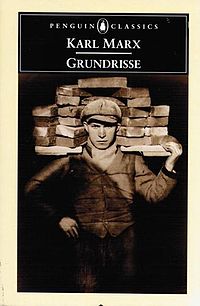Marx, Karl. Grundrisse: Foundations of the Critique of Political Economy. Martin Nicolaus, trans. London: Penguin Books, 1993.
Excerpt:
“I examine the system of bourgeois economy in the following order: capital, landed property, wage-labour; the State, foreign trade, world market.
The economic conditions of existence of the three great classes into which modern bourgeois society is divided are analysed under the first three headings; the interconnection of the other three headings is self-evident. The first part of the first book, dealing with Capital, comprises the following chapters: 1. The commodity, 2. Money or simple circulation; 3. Capital in general. The present part consists of the first two chapters. The entire material lies before me in the form of monographs, which were written not for publication but for self-clarification at widely separated periods; their remoulding into an integrated whole according to the plan I have indicated will depend upon circumstances.
A general introduction, which I had drafted, is omitted, since on further consideration it seems to me confusing to anticipate results which still have to be substantiated, and the reader who really wishes to follow me will have to decide to advance from the particular to the general. A few brief remarks regarding the course of my study of political economy are appropriate here.
Although I studied jurisprudence, I pursued it as a subject subordinated to philosophy and history. In the year 1842-43, as editor of the Rheinische Zeitung, I first found myself in the embarrassing position of having to discuss what is known as material interests. The deliberations of the Rhenish Landtag on forest thefts and the division of landed property; the official polemic started by Herr von Schaper, then Oberprasident of the Rhine Province, against the Rheinische Zeitung about the condition of the Moselle peasantry, and finally the debates on free trade and protective tariffs caused me in the first instance to turn my attention to economic questions. On the other hand, at that time when good intentions “to push forward” often took the place of factual knowledge, an echo of French socialism and communism, slightly tinged by philosophy, was noticeable in the Rheinische Zeitung. I objected to this dilettantism, but at the same time frankly admitted in a controversy with the Allgemeine Augsburger Zeitung that my previous studies did not allow me to express any opinion on the content of the French theories. When the publishers of the Rheinische Zeitung conceived the illusion that by a more compliant policy on the part of the paper it might be possible to secure the abrogation of the death sentence passed upon it, I eagerly grasped the opportunity to withdraw from the public stage to my study.”
Online:
Amazon
Free edition (Collected Works)
